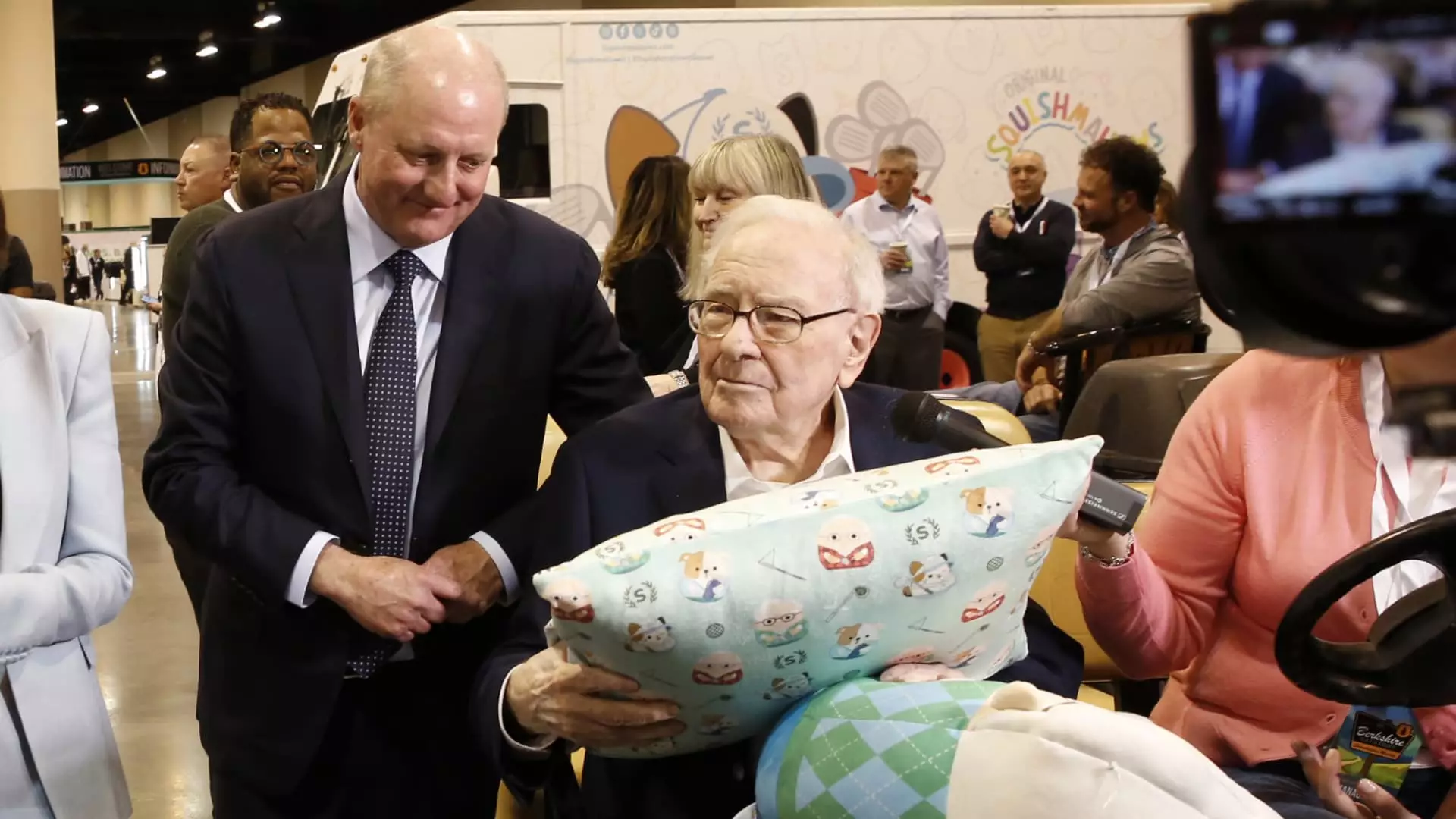As Warren Buffett, the venerated “Oracle of Omaha,” prepares to hand over the reins of Berkshire Hathaway to incoming CEO Greg Abel, retail investors have made a bold statement of faith by pouring more than $24 million into Berkshire’s Class B stock. This remarkable influx marks not just a financial maneuver but a testament to a changing tide in how everyday traders view this investment behemoth. The outpouring of funds comes in the wake of Buffett’s surprising announcement during the recent annual shareholders meeting—an event that saw thousands pilgrimage to Omaha, adorned in Buffett-branded paraphernalia, eager to glean insights from the legendary investor.
Buffett’s decision to transition leadership at the ripe age of 94 should have caused tremors in the stock market, and yet, quite ironically, it did not. Retail investors defied conventional wisdom, which suggests that small-scale traders would be wary amidst such uncertainty. Instead, they demonstrated collective confidence in Abel’s capabilities, despite his unproven track record relative to the charismatic investor they idolize. The magnitude of the net inflows observed—over three times the amount recorded the previous Friday—speaks volumes about retail investors’ sentiments and hints at a larger cultural shift within this demographic.
Buffett’s Enduring Shadow and the Weight of Legacy
The historical weight of this transition cannot be ignored. Buffett has long represented the archetype of successful investing, offering the average person access to wealth-building strategies that once seemed the domain of the elite. His announcement that he would not divest a single share but would instead remain as chairman serves as both a balm and a double-edged sword. On the one hand, it comforts investors who associate the brand with his financial prowess; on the other, it underscores the uncertainty surrounding Abel’s ability to fill those soaring shoes effectively.
Critics may argue that Abel lacks that undeniable spark of genius that has characterized Buffett’s tenure, particularly his elusive ability to pick stocks that deliver consistent value. It raises pressing questions about the future trajectory of Berkshire Hathaway. If Abel’s leadership can’t replicate the spirit and success of Buffett, will the behemoth falter in its next chapter? Retail investors are not just betting on Abel; they’re banking on the legacy that Buffett has built through shrewd decision-making and an almost instinctual understanding of market movements. The fragility of this transition casts a long shadow over an otherwise encouraging financial response.
The Market Pulse: How Will Berkshire Navigate Turbulent Waters?
Moreover, as investors peer into the future, there’s a collective curiosity regarding Berkshire’s strategic direction under its new leadership. Although the conglomerate boasts an impressive cash reserve exceeding $330 billion—a financial bulwark during potential economic downturns—what kind of decisive moves will Abel pursue? The upcoming leadership may need more than just an ample war chest; they’ll require a vision that resonates with retail and institutional investors alike.
Buffett’s assertion that Berkshire might perform better under Abel than it did under him seems to resonate well with retail investors who are eager to see tangible changes. For those who perceive the growing specter of economic hardships, the allure of Berkshire as a “safe haven” under Abel’s stewardship could be the Golden Goose of investment opportunities. The narrative goes beyond mere stock performance; it’s also about trust and belief in a fundamentally sound business model that will survive any impending storm.
The rumblings about global economic challenges this year have inevitably led many to consider Berkshire’s resilience. Stocks under Buffett’s management have outperformed the S&P 500 for decades, but as we approach an era poised for volatility, the question lingers—will this success continue? Retail investors, emboldened by their latest financial commitments, seem to believe so, echoing a sentiment that perhaps Buffett’s legacy—a combination of prudent cash management and strategic acquisitions—will endure, even if the helm changes hands.
The Everyman’s Investment Dream: A Charismatic Turn of Events
In an era where technocratic financial advice often feels inaccessible, the fervor surrounding Buffett’s announcement brings back the romantic notion of the stock market as a realm where regular people can strive for prosperity. What’s equally fascinating is the dynamic between old-school investing ethos and the fast-paced, meme-driven culture of the current market environment. Retail investors, emboldened by community discussions and social media, are more likely to take daring positions—even amidst uncertainties like those posed by a leadership transition within Berkshire.
This behavior reinforces a broader trend where the retail investor increasingly teaches themselves and supports one another in exploring the often-misunderstood financial landscape. The record inflows into Berkshire Hathaway’s Class B stock reflect more than simple speculative trading; they signal an evolution in investor behavior—a desire to engage deeply with corporate identities while aligning those identities with their preferences.
In a world where investment wisdom often feels elite, the relationship that everyday investors foster with a company led by charismatic figures remains incredibly powerful. Whether this current sentiment translates into long-term success for Berkshire Hathaway may unfold over time, but one thing is certain: retail investors aren’t going away and are ready to stake their claim in this unfolding narrative.

